Ethical Dilemma in Hospitals and Health Sectors: A Case Study Analysis
VerifiedAdded on 2022/08/23
|7
|2096
|66
Project
AI Summary
This paper delves into an ethical dilemma encountered by a nurse at International Concord Hospital. The case involves a patient with respiratory distress and bowel cancer whose family members disagree on treatment options, creating a conflict between the patient's autonomy and the daughter's wishes. The paper explores the dilemma through the lens of various ethical theories, including consequentialism, deontology, and virtue ethics, examining how these frameworks inform the decision-making process. It highlights the complexities of balancing patient rights, family preferences, and professional obligations within the healthcare context. The paper concludes by emphasizing the importance of ethical reasoning, moral distress management, and the need for a patient-centered approach in resolving such challenging situations, underscoring the significance of collaborative decision-making and the role of ethical frameworks in guiding healthcare professionals. The author also discusses feminist ethics and its impact on the case.
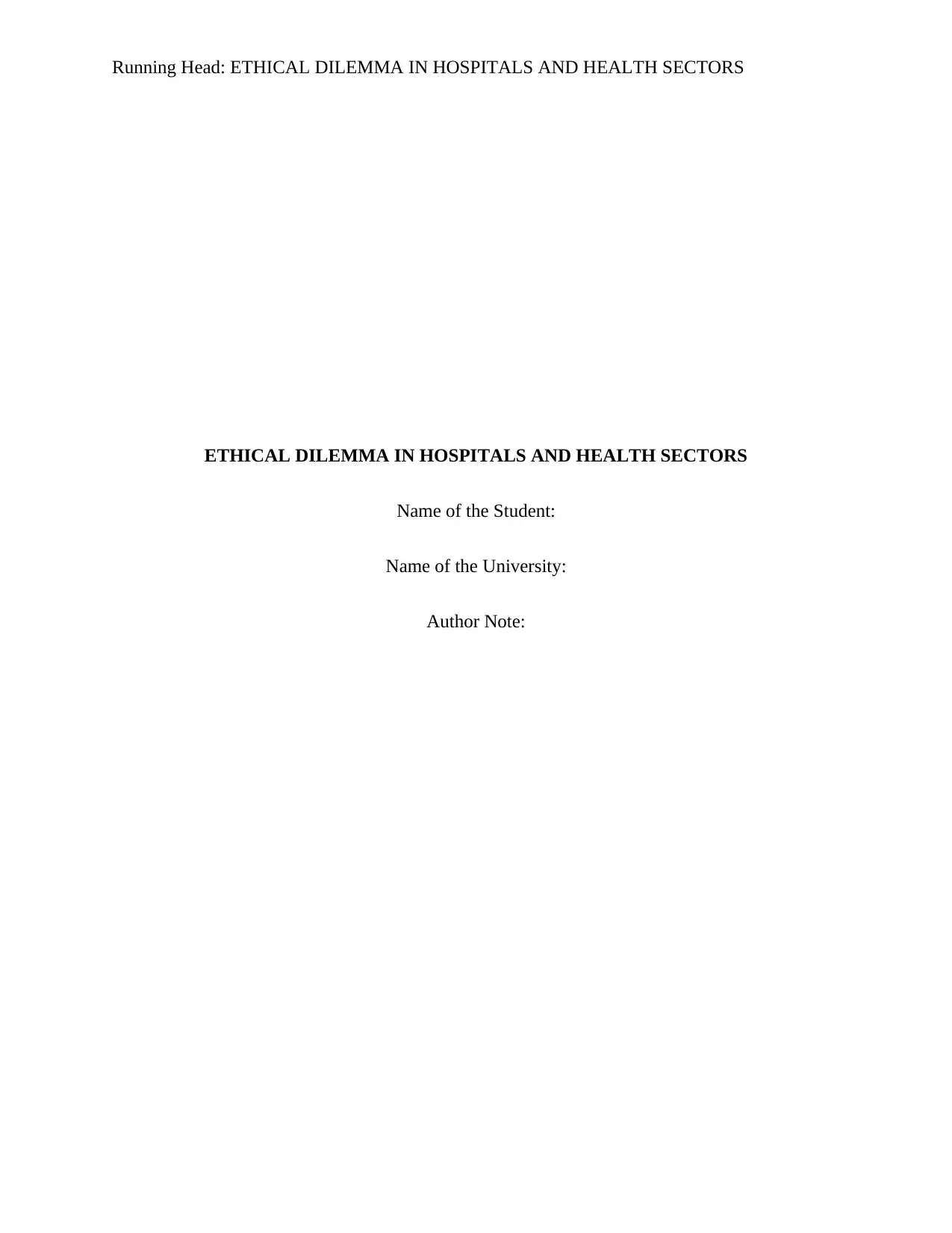
Running Head: ETHICAL DILEMMA IN HOSPITALS AND HEALTH SECTORS
ETHICAL DILEMMA IN HOSPITALS AND HEALTH SECTORS
Name of the Student:
Name of the University:
Author Note:
ETHICAL DILEMMA IN HOSPITALS AND HEALTH SECTORS
Name of the Student:
Name of the University:
Author Note:
Paraphrase This Document
Need a fresh take? Get an instant paraphrase of this document with our AI Paraphraser
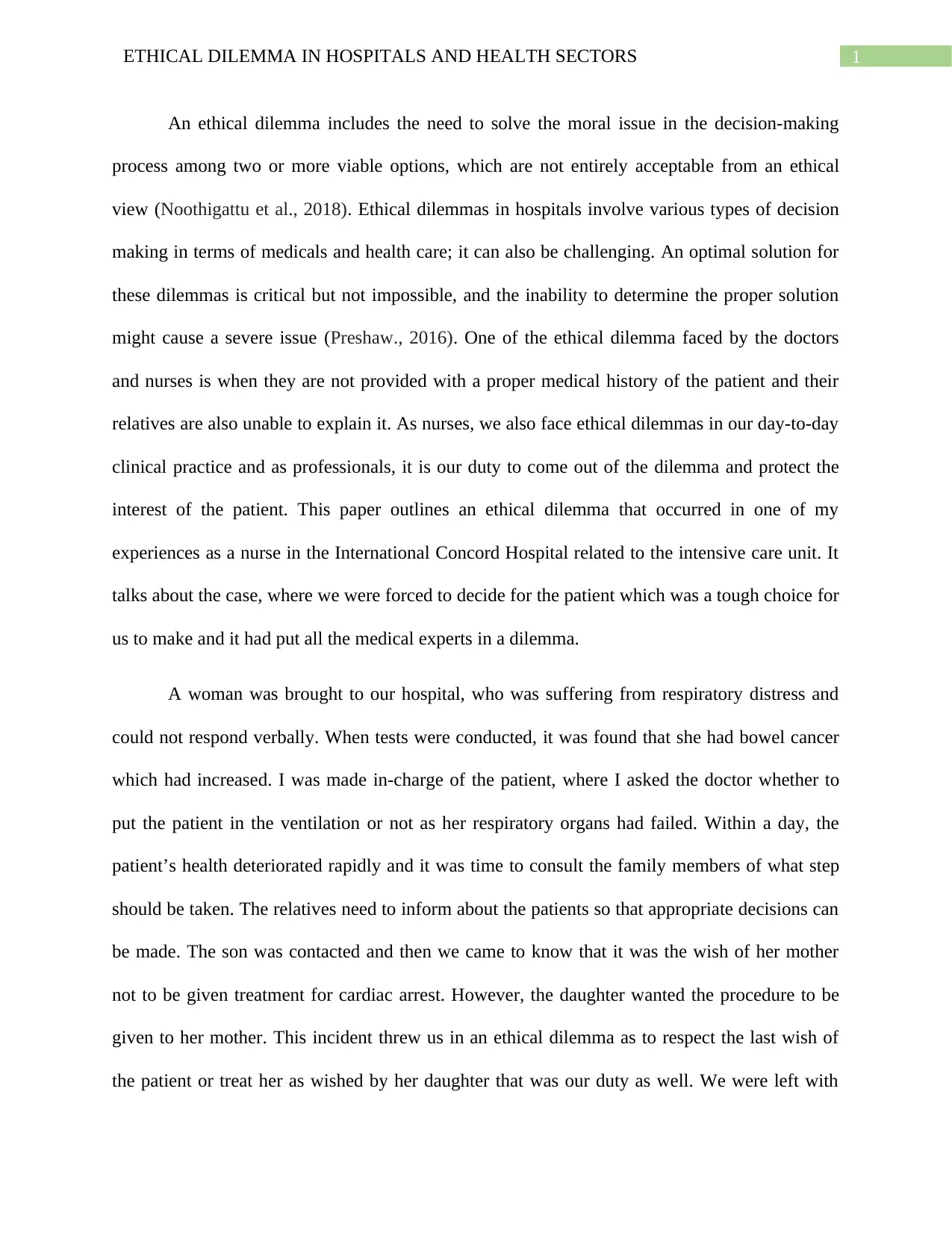
1ETHICAL DILEMMA IN HOSPITALS AND HEALTH SECTORS
An ethical dilemma includes the need to solve the moral issue in the decision-making
process among two or more viable options, which are not entirely acceptable from an ethical
view (Noothigattu et al., 2018). Ethical dilemmas in hospitals involve various types of decision
making in terms of medicals and health care; it can also be challenging. An optimal solution for
these dilemmas is critical but not impossible, and the inability to determine the proper solution
might cause a severe issue (Preshaw., 2016). One of the ethical dilemma faced by the doctors
and nurses is when they are not provided with a proper medical history of the patient and their
relatives are also unable to explain it. As nurses, we also face ethical dilemmas in our day-to-day
clinical practice and as professionals, it is our duty to come out of the dilemma and protect the
interest of the patient. This paper outlines an ethical dilemma that occurred in one of my
experiences as a nurse in the International Concord Hospital related to the intensive care unit. It
talks about the case, where we were forced to decide for the patient which was a tough choice for
us to make and it had put all the medical experts in a dilemma.
A woman was brought to our hospital, who was suffering from respiratory distress and
could not respond verbally. When tests were conducted, it was found that she had bowel cancer
which had increased. I was made in-charge of the patient, where I asked the doctor whether to
put the patient in the ventilation or not as her respiratory organs had failed. Within a day, the
patient’s health deteriorated rapidly and it was time to consult the family members of what step
should be taken. The relatives need to inform about the patients so that appropriate decisions can
be made. The son was contacted and then we came to know that it was the wish of her mother
not to be given treatment for cardiac arrest. However, the daughter wanted the procedure to be
given to her mother. This incident threw us in an ethical dilemma as to respect the last wish of
the patient or treat her as wished by her daughter that was our duty as well. We were left with
An ethical dilemma includes the need to solve the moral issue in the decision-making
process among two or more viable options, which are not entirely acceptable from an ethical
view (Noothigattu et al., 2018). Ethical dilemmas in hospitals involve various types of decision
making in terms of medicals and health care; it can also be challenging. An optimal solution for
these dilemmas is critical but not impossible, and the inability to determine the proper solution
might cause a severe issue (Preshaw., 2016). One of the ethical dilemma faced by the doctors
and nurses is when they are not provided with a proper medical history of the patient and their
relatives are also unable to explain it. As nurses, we also face ethical dilemmas in our day-to-day
clinical practice and as professionals, it is our duty to come out of the dilemma and protect the
interest of the patient. This paper outlines an ethical dilemma that occurred in one of my
experiences as a nurse in the International Concord Hospital related to the intensive care unit. It
talks about the case, where we were forced to decide for the patient which was a tough choice for
us to make and it had put all the medical experts in a dilemma.
A woman was brought to our hospital, who was suffering from respiratory distress and
could not respond verbally. When tests were conducted, it was found that she had bowel cancer
which had increased. I was made in-charge of the patient, where I asked the doctor whether to
put the patient in the ventilation or not as her respiratory organs had failed. Within a day, the
patient’s health deteriorated rapidly and it was time to consult the family members of what step
should be taken. The relatives need to inform about the patients so that appropriate decisions can
be made. The son was contacted and then we came to know that it was the wish of her mother
not to be given treatment for cardiac arrest. However, the daughter wanted the procedure to be
given to her mother. This incident threw us in an ethical dilemma as to respect the last wish of
the patient or treat her as wished by her daughter that was our duty as well. We were left with
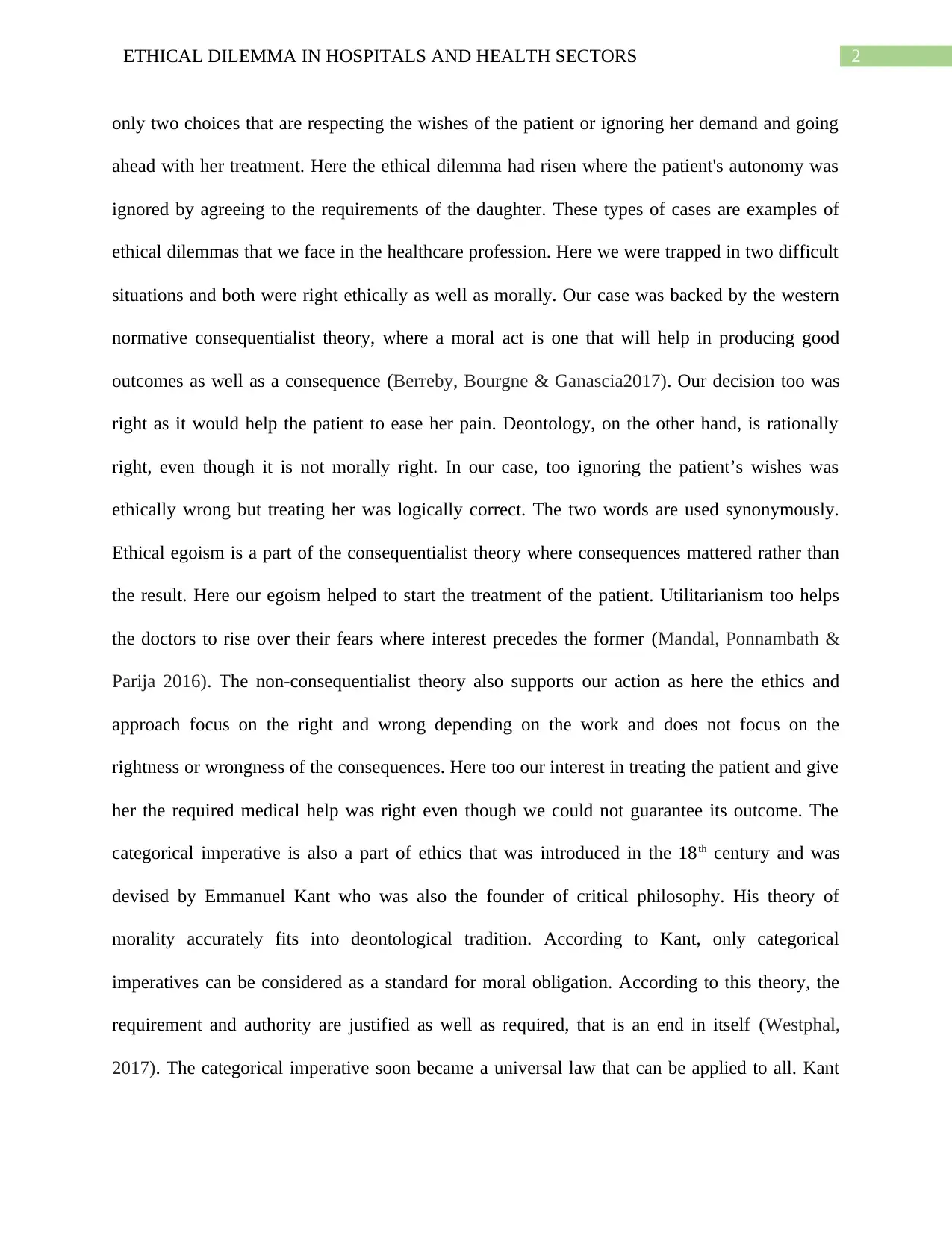
2ETHICAL DILEMMA IN HOSPITALS AND HEALTH SECTORS
only two choices that are respecting the wishes of the patient or ignoring her demand and going
ahead with her treatment. Here the ethical dilemma had risen where the patient's autonomy was
ignored by agreeing to the requirements of the daughter. These types of cases are examples of
ethical dilemmas that we face in the healthcare profession. Here we were trapped in two difficult
situations and both were right ethically as well as morally. Our case was backed by the western
normative consequentialist theory, where a moral act is one that will help in producing good
outcomes as well as a consequence (Berreby, Bourgne & Ganascia2017). Our decision too was
right as it would help the patient to ease her pain. Deontology, on the other hand, is rationally
right, even though it is not morally right. In our case, too ignoring the patient’s wishes was
ethically wrong but treating her was logically correct. The two words are used synonymously.
Ethical egoism is a part of the consequentialist theory where consequences mattered rather than
the result. Here our egoism helped to start the treatment of the patient. Utilitarianism too helps
the doctors to rise over their fears where interest precedes the former (Mandal, Ponnambath &
Parija 2016). The non-consequentialist theory also supports our action as here the ethics and
approach focus on the right and wrong depending on the work and does not focus on the
rightness or wrongness of the consequences. Here too our interest in treating the patient and give
her the required medical help was right even though we could not guarantee its outcome. The
categorical imperative is also a part of ethics that was introduced in the 18th century and was
devised by Emmanuel Kant who was also the founder of critical philosophy. His theory of
morality accurately fits into deontological tradition. According to Kant, only categorical
imperatives can be considered as a standard for moral obligation. According to this theory, the
requirement and authority are justified as well as required, that is an end in itself (Westphal,
2017). The categorical imperative soon became a universal law that can be applied to all. Kant
only two choices that are respecting the wishes of the patient or ignoring her demand and going
ahead with her treatment. Here the ethical dilemma had risen where the patient's autonomy was
ignored by agreeing to the requirements of the daughter. These types of cases are examples of
ethical dilemmas that we face in the healthcare profession. Here we were trapped in two difficult
situations and both were right ethically as well as morally. Our case was backed by the western
normative consequentialist theory, where a moral act is one that will help in producing good
outcomes as well as a consequence (Berreby, Bourgne & Ganascia2017). Our decision too was
right as it would help the patient to ease her pain. Deontology, on the other hand, is rationally
right, even though it is not morally right. In our case, too ignoring the patient’s wishes was
ethically wrong but treating her was logically correct. The two words are used synonymously.
Ethical egoism is a part of the consequentialist theory where consequences mattered rather than
the result. Here our egoism helped to start the treatment of the patient. Utilitarianism too helps
the doctors to rise over their fears where interest precedes the former (Mandal, Ponnambath &
Parija 2016). The non-consequentialist theory also supports our action as here the ethics and
approach focus on the right and wrong depending on the work and does not focus on the
rightness or wrongness of the consequences. Here too our interest in treating the patient and give
her the required medical help was right even though we could not guarantee its outcome. The
categorical imperative is also a part of ethics that was introduced in the 18th century and was
devised by Emmanuel Kant who was also the founder of critical philosophy. His theory of
morality accurately fits into deontological tradition. According to Kant, only categorical
imperatives can be considered as a standard for moral obligation. According to this theory, the
requirement and authority are justified as well as required, that is an end in itself (Westphal,
2017). The categorical imperative soon became a universal law that can be applied to all. Kant
⊘ This is a preview!⊘
Do you want full access?
Subscribe today to unlock all pages.

Trusted by 1+ million students worldwide
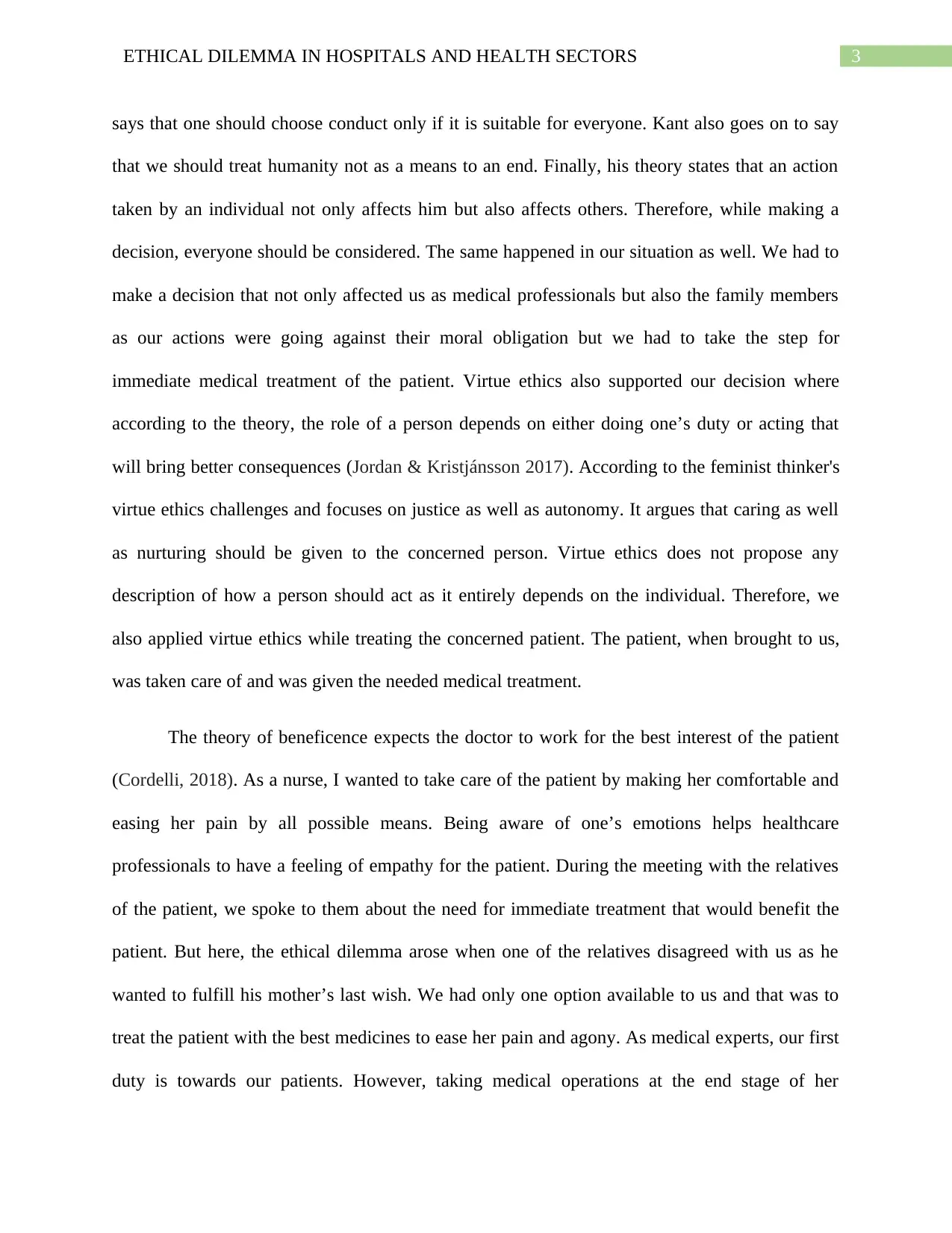
3ETHICAL DILEMMA IN HOSPITALS AND HEALTH SECTORS
says that one should choose conduct only if it is suitable for everyone. Kant also goes on to say
that we should treat humanity not as a means to an end. Finally, his theory states that an action
taken by an individual not only affects him but also affects others. Therefore, while making a
decision, everyone should be considered. The same happened in our situation as well. We had to
make a decision that not only affected us as medical professionals but also the family members
as our actions were going against their moral obligation but we had to take the step for
immediate medical treatment of the patient. Virtue ethics also supported our decision where
according to the theory, the role of a person depends on either doing one’s duty or acting that
will bring better consequences (Jordan & Kristjánsson 2017). According to the feminist thinker's
virtue ethics challenges and focuses on justice as well as autonomy. It argues that caring as well
as nurturing should be given to the concerned person. Virtue ethics does not propose any
description of how a person should act as it entirely depends on the individual. Therefore, we
also applied virtue ethics while treating the concerned patient. The patient, when brought to us,
was taken care of and was given the needed medical treatment.
The theory of beneficence expects the doctor to work for the best interest of the patient
(Cordelli, 2018). As a nurse, I wanted to take care of the patient by making her comfortable and
easing her pain by all possible means. Being aware of one’s emotions helps healthcare
professionals to have a feeling of empathy for the patient. During the meeting with the relatives
of the patient, we spoke to them about the need for immediate treatment that would benefit the
patient. But here, the ethical dilemma arose when one of the relatives disagreed with us as he
wanted to fulfill his mother’s last wish. We had only one option available to us and that was to
treat the patient with the best medicines to ease her pain and agony. As medical experts, our first
duty is towards our patients. However, taking medical operations at the end stage of her
says that one should choose conduct only if it is suitable for everyone. Kant also goes on to say
that we should treat humanity not as a means to an end. Finally, his theory states that an action
taken by an individual not only affects him but also affects others. Therefore, while making a
decision, everyone should be considered. The same happened in our situation as well. We had to
make a decision that not only affected us as medical professionals but also the family members
as our actions were going against their moral obligation but we had to take the step for
immediate medical treatment of the patient. Virtue ethics also supported our decision where
according to the theory, the role of a person depends on either doing one’s duty or acting that
will bring better consequences (Jordan & Kristjánsson 2017). According to the feminist thinker's
virtue ethics challenges and focuses on justice as well as autonomy. It argues that caring as well
as nurturing should be given to the concerned person. Virtue ethics does not propose any
description of how a person should act as it entirely depends on the individual. Therefore, we
also applied virtue ethics while treating the concerned patient. The patient, when brought to us,
was taken care of and was given the needed medical treatment.
The theory of beneficence expects the doctor to work for the best interest of the patient
(Cordelli, 2018). As a nurse, I wanted to take care of the patient by making her comfortable and
easing her pain by all possible means. Being aware of one’s emotions helps healthcare
professionals to have a feeling of empathy for the patient. During the meeting with the relatives
of the patient, we spoke to them about the need for immediate treatment that would benefit the
patient. But here, the ethical dilemma arose when one of the relatives disagreed with us as he
wanted to fulfill his mother’s last wish. We had only one option available to us and that was to
treat the patient with the best medicines to ease her pain and agony. As medical experts, our first
duty is towards our patients. However, taking medical operations at the end stage of her
Paraphrase This Document
Need a fresh take? Get an instant paraphrase of this document with our AI Paraphraser
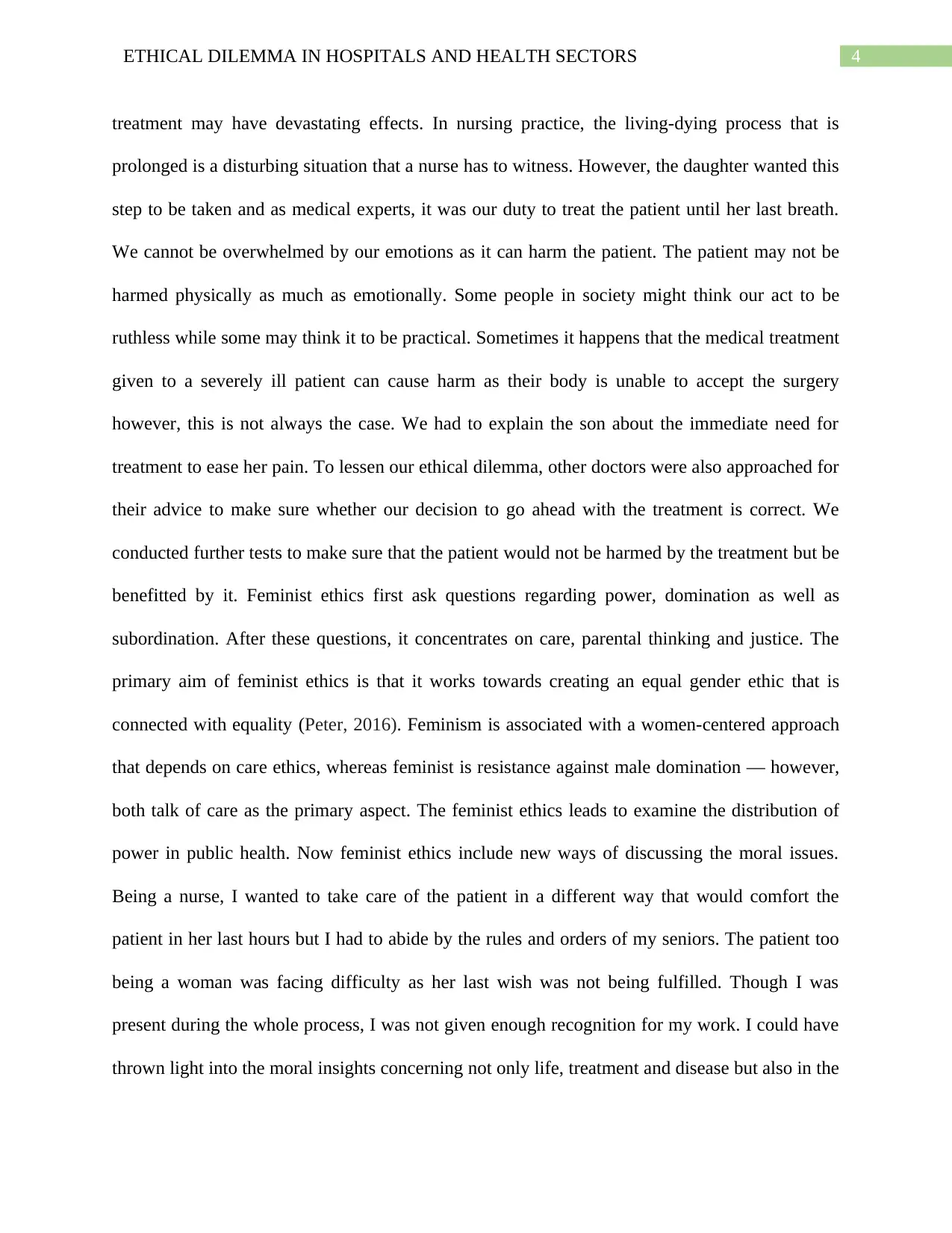
4ETHICAL DILEMMA IN HOSPITALS AND HEALTH SECTORS
treatment may have devastating effects. In nursing practice, the living-dying process that is
prolonged is a disturbing situation that a nurse has to witness. However, the daughter wanted this
step to be taken and as medical experts, it was our duty to treat the patient until her last breath.
We cannot be overwhelmed by our emotions as it can harm the patient. The patient may not be
harmed physically as much as emotionally. Some people in society might think our act to be
ruthless while some may think it to be practical. Sometimes it happens that the medical treatment
given to a severely ill patient can cause harm as their body is unable to accept the surgery
however, this is not always the case. We had to explain the son about the immediate need for
treatment to ease her pain. To lessen our ethical dilemma, other doctors were also approached for
their advice to make sure whether our decision to go ahead with the treatment is correct. We
conducted further tests to make sure that the patient would not be harmed by the treatment but be
benefitted by it. Feminist ethics first ask questions regarding power, domination as well as
subordination. After these questions, it concentrates on care, parental thinking and justice. The
primary aim of feminist ethics is that it works towards creating an equal gender ethic that is
connected with equality (Peter, 2016). Feminism is associated with a women-centered approach
that depends on care ethics, whereas feminist is resistance against male domination — however,
both talk of care as the primary aspect. The feminist ethics leads to examine the distribution of
power in public health. Now feminist ethics include new ways of discussing the moral issues.
Being a nurse, I wanted to take care of the patient in a different way that would comfort the
patient in her last hours but I had to abide by the rules and orders of my seniors. The patient too
being a woman was facing difficulty as her last wish was not being fulfilled. Though I was
present during the whole process, I was not given enough recognition for my work. I could have
thrown light into the moral insights concerning not only life, treatment and disease but also in the
treatment may have devastating effects. In nursing practice, the living-dying process that is
prolonged is a disturbing situation that a nurse has to witness. However, the daughter wanted this
step to be taken and as medical experts, it was our duty to treat the patient until her last breath.
We cannot be overwhelmed by our emotions as it can harm the patient. The patient may not be
harmed physically as much as emotionally. Some people in society might think our act to be
ruthless while some may think it to be practical. Sometimes it happens that the medical treatment
given to a severely ill patient can cause harm as their body is unable to accept the surgery
however, this is not always the case. We had to explain the son about the immediate need for
treatment to ease her pain. To lessen our ethical dilemma, other doctors were also approached for
their advice to make sure whether our decision to go ahead with the treatment is correct. We
conducted further tests to make sure that the patient would not be harmed by the treatment but be
benefitted by it. Feminist ethics first ask questions regarding power, domination as well as
subordination. After these questions, it concentrates on care, parental thinking and justice. The
primary aim of feminist ethics is that it works towards creating an equal gender ethic that is
connected with equality (Peter, 2016). Feminism is associated with a women-centered approach
that depends on care ethics, whereas feminist is resistance against male domination — however,
both talk of care as the primary aspect. The feminist ethics leads to examine the distribution of
power in public health. Now feminist ethics include new ways of discussing the moral issues.
Being a nurse, I wanted to take care of the patient in a different way that would comfort the
patient in her last hours but I had to abide by the rules and orders of my seniors. The patient too
being a woman was facing difficulty as her last wish was not being fulfilled. Though I was
present during the whole process, I was not given enough recognition for my work. I could have
thrown light into the moral insights concerning not only life, treatment and disease but also in the
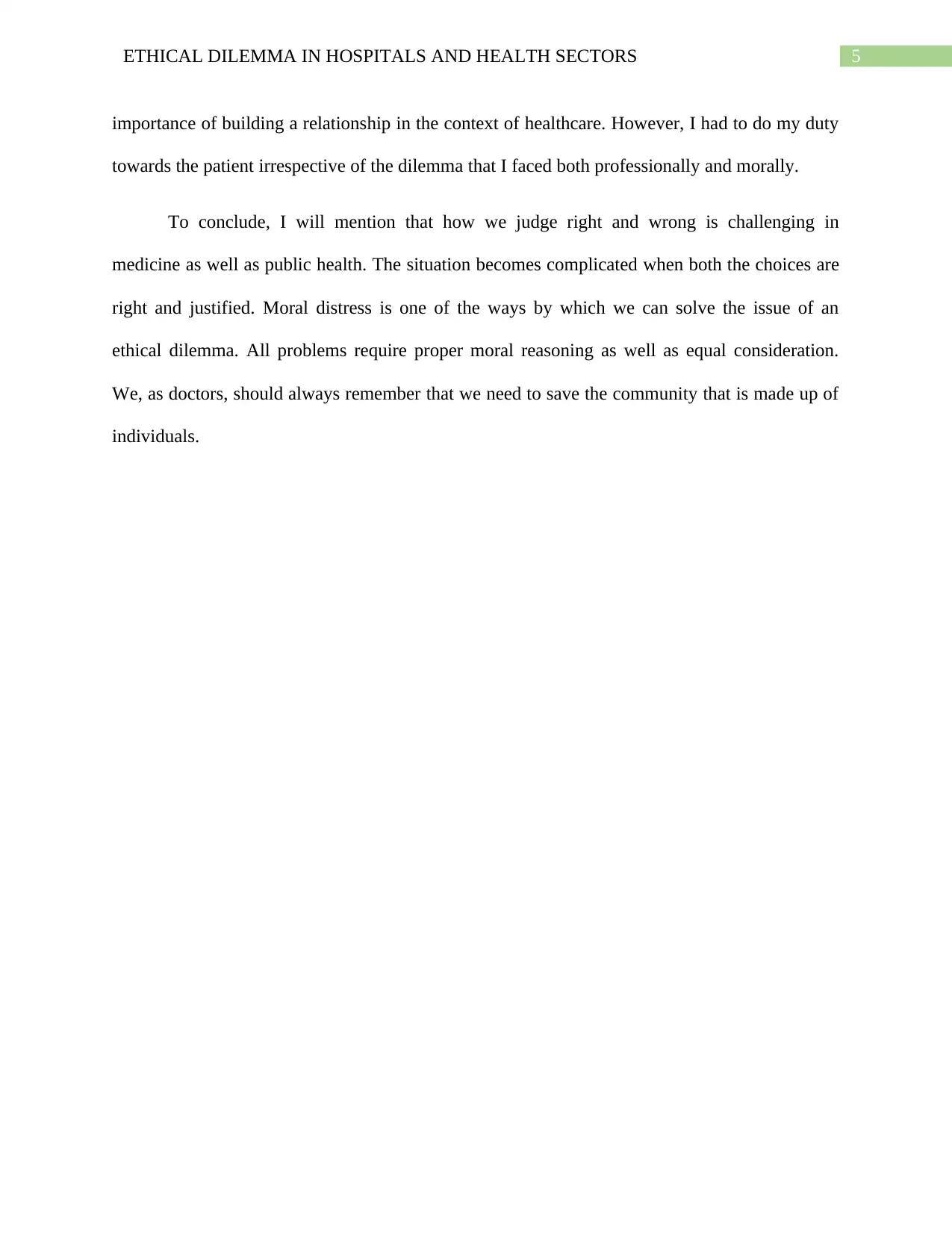
5ETHICAL DILEMMA IN HOSPITALS AND HEALTH SECTORS
importance of building a relationship in the context of healthcare. However, I had to do my duty
towards the patient irrespective of the dilemma that I faced both professionally and morally.
To conclude, I will mention that how we judge right and wrong is challenging in
medicine as well as public health. The situation becomes complicated when both the choices are
right and justified. Moral distress is one of the ways by which we can solve the issue of an
ethical dilemma. All problems require proper moral reasoning as well as equal consideration.
We, as doctors, should always remember that we need to save the community that is made up of
individuals.
importance of building a relationship in the context of healthcare. However, I had to do my duty
towards the patient irrespective of the dilemma that I faced both professionally and morally.
To conclude, I will mention that how we judge right and wrong is challenging in
medicine as well as public health. The situation becomes complicated when both the choices are
right and justified. Moral distress is one of the ways by which we can solve the issue of an
ethical dilemma. All problems require proper moral reasoning as well as equal consideration.
We, as doctors, should always remember that we need to save the community that is made up of
individuals.
⊘ This is a preview!⊘
Do you want full access?
Subscribe today to unlock all pages.

Trusted by 1+ million students worldwide
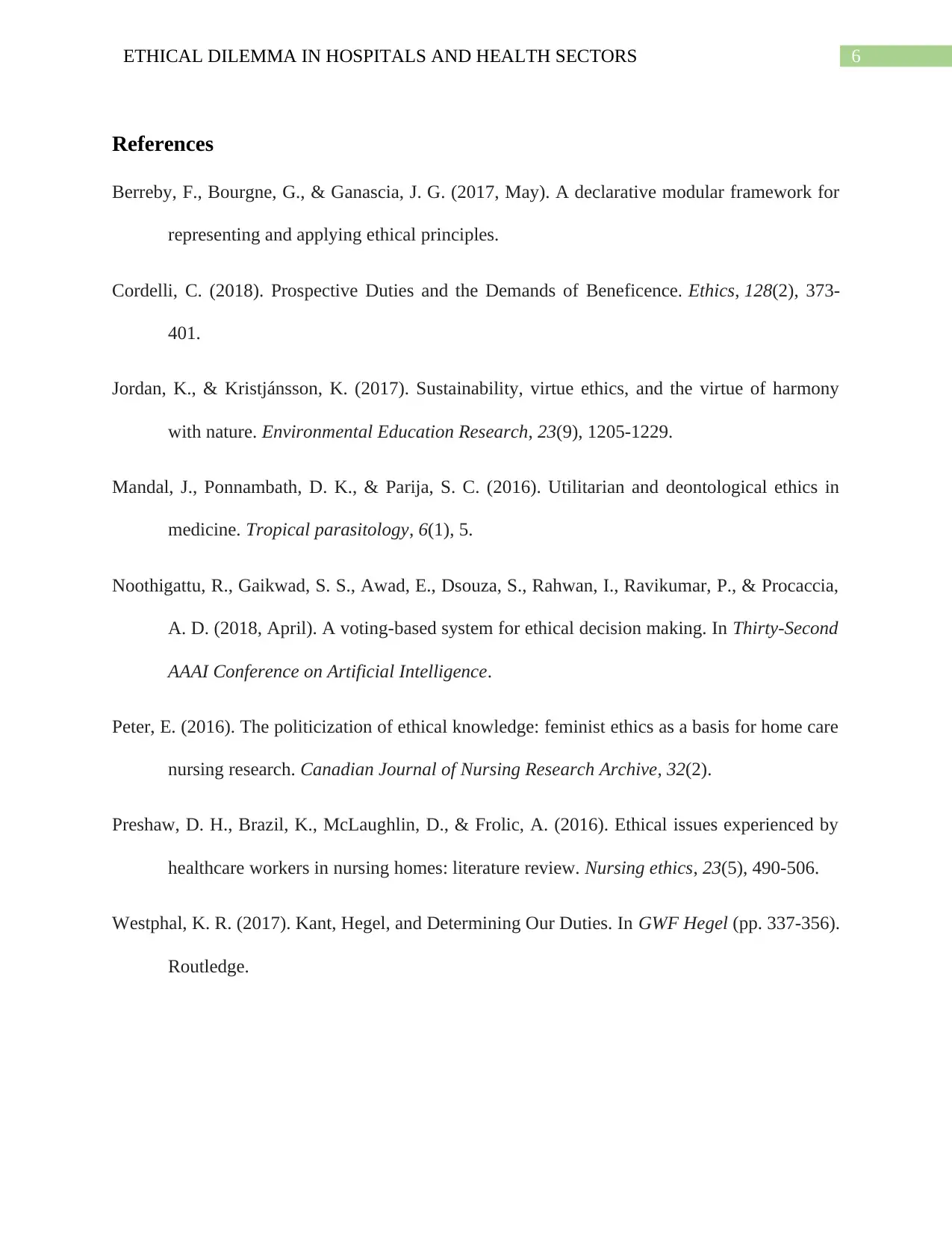
6ETHICAL DILEMMA IN HOSPITALS AND HEALTH SECTORS
References
Berreby, F., Bourgne, G., & Ganascia, J. G. (2017, May). A declarative modular framework for
representing and applying ethical principles.
Cordelli, C. (2018). Prospective Duties and the Demands of Beneficence. Ethics, 128(2), 373-
401.
Jordan, K., & Kristjánsson, K. (2017). Sustainability, virtue ethics, and the virtue of harmony
with nature. Environmental Education Research, 23(9), 1205-1229.
Mandal, J., Ponnambath, D. K., & Parija, S. C. (2016). Utilitarian and deontological ethics in
medicine. Tropical parasitology, 6(1), 5.
Noothigattu, R., Gaikwad, S. S., Awad, E., Dsouza, S., Rahwan, I., Ravikumar, P., & Procaccia,
A. D. (2018, April). A voting-based system for ethical decision making. In Thirty-Second
AAAI Conference on Artificial Intelligence.
Peter, E. (2016). The politicization of ethical knowledge: feminist ethics as a basis for home care
nursing research. Canadian Journal of Nursing Research Archive, 32(2).
Preshaw, D. H., Brazil, K., McLaughlin, D., & Frolic, A. (2016). Ethical issues experienced by
healthcare workers in nursing homes: literature review. Nursing ethics, 23(5), 490-506.
Westphal, K. R. (2017). Kant, Hegel, and Determining Our Duties. In GWF Hegel (pp. 337-356).
Routledge.
References
Berreby, F., Bourgne, G., & Ganascia, J. G. (2017, May). A declarative modular framework for
representing and applying ethical principles.
Cordelli, C. (2018). Prospective Duties and the Demands of Beneficence. Ethics, 128(2), 373-
401.
Jordan, K., & Kristjánsson, K. (2017). Sustainability, virtue ethics, and the virtue of harmony
with nature. Environmental Education Research, 23(9), 1205-1229.
Mandal, J., Ponnambath, D. K., & Parija, S. C. (2016). Utilitarian and deontological ethics in
medicine. Tropical parasitology, 6(1), 5.
Noothigattu, R., Gaikwad, S. S., Awad, E., Dsouza, S., Rahwan, I., Ravikumar, P., & Procaccia,
A. D. (2018, April). A voting-based system for ethical decision making. In Thirty-Second
AAAI Conference on Artificial Intelligence.
Peter, E. (2016). The politicization of ethical knowledge: feminist ethics as a basis for home care
nursing research. Canadian Journal of Nursing Research Archive, 32(2).
Preshaw, D. H., Brazil, K., McLaughlin, D., & Frolic, A. (2016). Ethical issues experienced by
healthcare workers in nursing homes: literature review. Nursing ethics, 23(5), 490-506.
Westphal, K. R. (2017). Kant, Hegel, and Determining Our Duties. In GWF Hegel (pp. 337-356).
Routledge.
1 out of 7
Related Documents
Your All-in-One AI-Powered Toolkit for Academic Success.
+13062052269
info@desklib.com
Available 24*7 on WhatsApp / Email
![[object Object]](/_next/static/media/star-bottom.7253800d.svg)
Unlock your academic potential
Copyright © 2020–2026 A2Z Services. All Rights Reserved. Developed and managed by ZUCOL.





